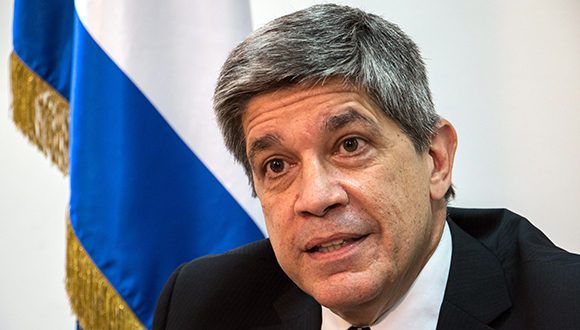
Carlos Fernandez de Cossio, General Director for U.S. Affairs at the Cuban Ministry of Foreign Affairs (MINREX).
HAVANA, Cuba.- Twenty days after the terrorist attack on the Cuban Embassy in Washington, the U.S. government is still silent. However, it included Havana in a unilateral list of countries that “do not cooperate” in the fight against terrorism, which has been described by Carlos Fernandez de Cossio, General Director for U.S. Affairs at the Cuban Ministry of Foreign Affairs (MINREX), as a political, deliberate and deeply dishonest act.
It is an illegitimate list that has no absolute recognition by any international forum or authorized collegiate body on counter-terrorism issues, and which seeks to discredit Cuba and pressure third countries in its relations with the island, the diplomat argued during a meeting with national press media last Tuesday, in which he also reviewed other substantial issues of deteriorating bilateral relations.
The first thing to understand, the diplomat said, is that since the 1980s, the U.S. has used as a foreign policy tool the practice of publishing lists in which they rates countries.
This emerged and continues to be explained by the isolation of the American authority suffers in international agencies, multilateral forums and the global community.
The impossibility of imposing its agenda and criteria in the face of the will of most States has led that Government to publish lists on different topics to point to other nations, Fernandez de Cossio emphasized.
The General Director for U.S. Affairs at MINREX mentioned the example of the list on combating drug trafficking, which is paradoxical, because it is known that globally, the U.S. is the fundamental market for drug trafficking.
It is in that territory that more money is generated and more fortunes exist as a result of drug trafficking, the diplomat highlighted.
The same is done with religious freedom and human trafficking, while it has at least two lists on the subject of terrorism, as in which Cuba is included, accused of not cooperating sufficiently with the U.S. effort to combat that scourge.
Something paradoxical in Fernandez de Cossio’s view, considering that the U.S. knows, as well as the international community, that Cuba has a vertical and consistent position against terrorism, our intolerance with any of its manifestations is absolute.
It is a factor that must be taken into account to observe this inclusion made by Washington, especially when the Caribbean nation has been victims of terrorism and thousands of Cubans have lost their lives for this cause.
Only in service and foreign policy, Cuba has been the subject of more than 500 terrorist acts, mostly forged, organized, funded and executed from U.S. territory, by individuals who live there and have enjoyed freedom under the protection of that government, despite being connoted and recognized extremists.
“I am not counting here state terrorism, practiced by the U.S. Government, specifically by the Central Intelligence Agency (CIA) against the people of Cuba,” the diplomat mentioned.
Fernandez de Cossio pointed out an essential factor, which is that – as the U.S. government knows – there are currently bilateral cooperation agreements, as well as on law enforcement and compliance, including combating terrorism.
He added that there had recently been concrete collaborative actions, some of them of benefit to the U.S. Government and of interest to its national security.
This is a confirmation that Cuba’s inclusion on the list is a political act, deliberate and deeply dishonest, with the use of lie, which is not uncommon in the current administration team, the diplomat denounced.
The General Director for U.S. Affairs at MINREX asserted that, unfortunately, certain countries or U.S. authorities in other nations pay attention to these ratings, and they act in some cases in correspondence.
The practical impact of entering this list of not fully cooperating with Washington’s counter-terrorism efforts is the prohibition of the sale or license for the export of military and defense goods and services to these states.
Taken from Cubadebate